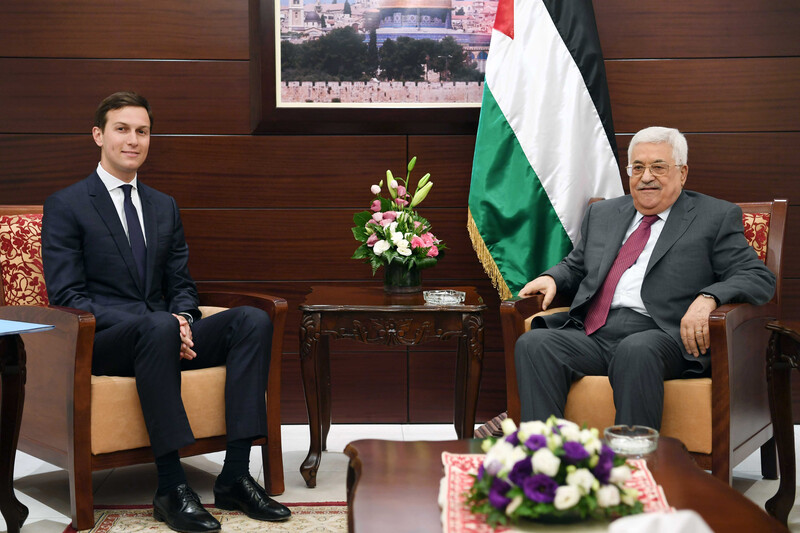Power Suits 14 November 2017

Palestinian Authority leader Mahmoud Abbas receives Jared Kushner, US peace process envoy and son-in-law of President Donald Trump, in the Israeli-occupied West Bank city of Ramallah, 21 June.
APA imagesAnother US presidency, another peace plan. Time has ticked on Donald Trump’s promise to secure the “ultimate deal,” and now we are reportedly getting close to some kind of concrete proposal.
There is no word yet as to just exactly what that proposal is. Trump appointed Jared Kushner, a senior presidential advisor, foreign policy novice and his son-in-law, as his special envoy to the peace process and he has now had 10 months to come up with something.
(Incidentally, that Kushner is Trump’s son-in-law prompted a most spectacular bit of orientalist writing in The New York Times report on the mooted peace plan where, “the fact that the president entrusted it to a close relative was taken as a sign of seriousness in the region.” Because, you know, Arabs.)
It would be tempting to hope that this particular administration might come up with something completely unheard of. After all, this is a president who in the early days of his administration seemed to challenge even two-state orthodoxy.
Since then, however, nothing the Trump administration has said or done has veered in any way from the usual pro-Israel Washington orthodoxy. And none of the speculation offered by the Times about the outlines of a Trump plan suggests anything new either.
A two-state solution is proffered as the ultimate goal with some “confidence-building” measures tossed in for getting there; an Israeli commitment to end construction in occupied territory outside settlement blocs and a Palestinian resumption of full security coordination with Israel (did that ever stop?).
So far, so very George W. Bush. And there is little to suggest that any new US proposal will look particularly different to the 2003 roadmap plan for peace, which placed the onus on the occupied Palestinians to prove to their occupiers, as well as to the so-called international community, that they deserved to have a state.
Instead of coming up with new proposals, it seems the US administration is basing its pitch on the fact that, while the script may be the same, the actors are different this time.
A brash new face
That is not entirely true though. Both Benjamin Netanyahu, the Israeli prime minister, and Mahmoud Abbas, the Palestinian Authority leader, have been around for decades. The latter was signatory to the Oslo accords in 1993 and co-produced his own peace plan, the Abu Mazen-Beilin plan in 1995. The former was instrumental in unravelling the Oslo accords, and has since shown little interest in any peace plan, proposal or process.
These are actors with little new to offer. They have seen several presidents come and go. And if the White House only throws up the same-old, same-old again, as is predicted, Trump will be just another one.
The potentially more significant new actor is in Saudi Arabia, where Crown Prince Mohammad bin Salman is busy not only consolidating power, but throwing his country’s quite considerable weight around in a manner that would have been unthinkable not long ago.
Waging both diplomatic and real war with its fellow Gulf countries and neighbors and summoning foreign leaders to Riyadh to receive their marching orders, the prince – widely seen as the real power in Saudi Arabia – has apparently set his country on a collision course with Iran, seeking to reset a regional balance of power that over the past decade Riyadh sees as having swung in Tehran’s favor.
This antipathy to all things Iranian – a Gulf obsession ever since the revolution of 1979 suggested that religious legitimacy could be married to political power, posing a direct threat to the hereditary family rule of most Gulf countries – has now planted Riyadh firmly in Israel’s camp, where Iran has long been demonized.
But a real common front cannot be made until the little matter of the Palestinian issue is resolved. And having for decades tried and failed to convince the West to convince Israel via the backdoor to do something, pretty please, it seems an impatient prince wants to short cut that strategy.
Thus it was that Israeli media reported that Abbas was summoned to Riyadh and told in no uncertain terms to accept the upcoming Trump peace plan or resign.
A rich player, strutting
Whether those reports are true or not, there are a few problems with such an approach. One, of course, is perennial: what exactly are the details of the deal being concocted in Washington? But even assuming that MBS, as the Saudi crown prince is widely known, is not interested in details and only wants action, he is barking up the wrong tree with Abbas.
Abbas has little legitimacy left among his own people. Having unilaterally extended his four-year term by seven years, Abbas has over that decade-and-a-bit made no headway toward a resolution of the Palestinian cause.
On the contrary, and gaining UN status for Palestine aside, he has presided over a debilitating Palestinian divide and seen the ground literally disappear from beneath his feet as Israel has continued its settlement construction apace.
Not only would it be quite impossible for him to impose a peace deal on Palestinians dictated from Washington that is unlikely to meet many, if any, of the so-called Palestinian constants, Abbas’ resignation, polls suggest, would also be widely welcomed.
And why, in any case, would Israel want to sign off on a deal that, regardless of how favorable, would probably see it relinquish at least some of the impunity with which it currently acts in occupied territory? Diplomatic relations with a couple of Gulf countries? Trade ties? These, of course, would not be insignificant achievements for Israel, but nor is the price being asked: to fight Iran at Riyadh’s behest.
Finally, of course, nothing in the track record of MBS so far suggests that, on foreign policy at least, he has the slightest clue what he is doing. After all, Yemen has resisted Saudi Arabia’s military; Qatar has resisted Riyadh-imposed isolation; Syria’s president Bashar al-Assad has resisted Saudi and Gulf attempts to overthrow him and Lebanon has, so far, resisted being thrown into chaos by the resignation, forced or otherwise, of Saad Hariri, its prime minister.
There may be a new US peace initiative backed by new faces emitting a lot of sound and fury. But there is little to suggest that anything of significance will come of it.





Comments
“Surrender”
Permalink Robert D. Brooks, Ph. D. replied on
As a long-time supporter of the Palestinian cause, and witness to the ever- expanding land grab and subjugation by the Israelis, I think there may be some wisdom in a strategic surrender by the Palestinians. It would yield a one state solution and,potentially, the Paestinians could press for justice from within. No guarantees, of course, but anything is better than the status quo, me thinks.